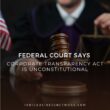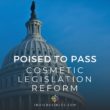In November, I shared my views as leader of IBN on the FDA Globalization Act of 2009. This post was followed by a second trip to Washington, DC to meet with Food & Drug Administration (FDA) officials and staffers in the House Energy & Commerce Committee. I have also shared my views on President Obama's initiatives to earmark additional funds to support small business owners as our nation faces the challenges of a recessionary economy.
As you can see from this series of posts, the potential for passage of new cosmetics laws at the federal level has existed since early 2008. We have been told that one of the factors currently preventing progress on these issues is the economy and health care. While the House Energy & Commerce Committee and all of Congress remains “on pause” regarding the FDA Globalization Act of 2009, other federal lawmakers have introduced other bills that would regulate cosmetics. These include the Safe Baby Products Act of 2009 and the Household Product Labeling Act of 2009. Not to be outdone (and probably due in part to the status of the federal legislation), at the prompting of self-motivated consumer groups, lawmakers in various states are beginning to introduce legislation that would regulate cosmetics in their own back yards. One of them is the Colorado Safe Personal Care Products Act.
IBN member Kayla Fioravanti of Essential Wholesale published a great summary of the legislation, along with her commentary on why the poorly drafted bill should not become law. Those interested can track the progress of the Colorado bill here. This bill and other pieces of pending state legislation are based on experiences and opinions held by state lawmakers and their constituents, and are backed in large part by the Environmental Working Group and the Campaign For Safe Cosmetics. To read more about the potentially faulty science that supports the framework for this bill, please read Kayla's post. As we probe the incorrect scientific presumptions behind the bill, we must also be aware of the practical adverse impact that passage of this bill would have on consumers and small business owners.
- The FDA regulates cosmetics. The federal government regulates cosmetics through the Food Drug & Cosmetic Act and the Fair Packaging and Labeling Act. These are comprehensive pieces of legislation that have been in place for decades. While there is little doubt that it is time for a revision of these laws in some areas, they are quite comprehensive in nature.The Colorado bill makes it illegal to sell cosmetics that contain ingredients that cause cancer or reproductive toxicity. Aside from the questions raised in Kayla's post about what entities Colorado will rely on to conduct and publish the studies that identify such ingredients (five federal agencies and “formally organized programs or groups recognized as authoritative” is language that is filled with potential for abuse), it should be noted that the federal government already prohibits the sale of cosmetics containing “any poisonous or deleterious substance which may render it injurious to users.”
While states are free under the US constitutional system to pass laws that do not conflict with federal law, the question whether doing so is in the interests of its citizens in the face of the federal laws here, is an issue that does not seem to have been taken into account where this bill is concerned.
- A patchwork of state laws would frustrate consumers and annhialate businesses large and small. While a particular state law, such as the Colorado bill, can be written only to impact cosmetics sold within that state, the impact of such a law reaches far beyond state boundaries. Consumers seeking to purchase cosmetics from all 50 states will have their choices severely limited simply because manufacturers both inside and outside the state will stop selling products to consumers there because they cannot afford to expose themselves to liability.Companies that remain in the Colorado market are likely to raise their prices to account for increased regulation. Those that cannot afford to raise prices will simply exit the market, leaving Colorado consumers with limited options and variety when it comes to their personal care products.
If all 50 states are then moved to pass similar laws of their own, there will be no coherent standard by which commerce can be conducted. Consumers seeking to purchase products made outside their state will be frustrated to find that many of their favorites are not available unless they are purchased in a different state. Businesses will not be able to plan for future growth and expansion if they must first consult 50 state laws, and federal law, to make sure they are either in compliance or put policies in place to do business in some states and avoid doing business in others.
The adverse effects of different laws regulating the exact same products will frustrate everyone involved: consumers, lawmakers and manufacturers, and even the layperson juries who will have to sort through mountains of complicated scientific evidence and testimony to decide whether or not civil penalties are appropriate in any given case. Of course, the only people that may potentially benefit are the attorneys who will collect awards of $5,000 for the first violation and $10,000 for each subsequent violation.
- There is no exemption for small businesses, which are not contributing to the problem the bill seeks to solve. While it may be true that some companies manufacture cosmetics with chemicals that warrant increased scrutiny, this assumption cannot and should not be made about the cosmetics industry in general. Cosmetics are among the safest products sold in the nation today, and they always have been.Moreover, to the extent some ingredients are problematic (and which ones and how to identify them is a huge issue), small companies are generally not to blame. In fact, small businesses often launched because of the notion that cosmetics could be made with a larger proportion of more desirable ingredients than have typically been used by traditional cosmetics manufacturers. Passage of a bill like this one would drive large numbers of these small businesses out of the state of Colorado without providing any increased protection for the citizens in the state.
Such a result would not be unlike what happened upon passage of the Consumer Product Safety Improvement Act of 2008. CPSIA, which originated in Energy & Commerce, was signed into law by President Bush in August 2008 in order to curb the behavior of very large companies that were importing toys that contained unacceptable levels of lead content. The safety testing requirement is supposed to force companies to produce safer products, which in turn benefits consumers.
While the law has noble goals, since the same law applies with equal force to all market participants, even the tiny companies that are not contributing to the problem, the law forced small companies out of business simply because they could not afford to comply with it — and even though their products contained none of the undesirable lead components. These little companies did not import toys or toy components. In fact, many of them made children’s products for years in small manufacturing facilities in small towns in states throughout the country. Many of them were women-owned small businesses.
While a federal law was at issue there, the same type of situation exists here at the state level, where it is larger companies that are causing the problem sought to be addressed by the law. But the adverse impact of the law will fall unfairly on consumers and small businesses, neither of which are contributing to the problem in the first place.
More Unanswered Questions
Aside from the important legal and business issues raised here, a law that purports to list ingredients that are “toxic,” and therefore should not be used to make products should be carefully scrutinized to ensure that it is carefully tailored to have the desired effect. In this case, the biggest flaw in the law is not the desired outcome, but the manner in which the outcome is pursued. Putting at least five governmental agencies and any other entity calling itself an “authority” (including EWG and CFSC) in charge of what is and is not a potentially harmful ingredient is a recipe for gridlock, misunderstanding and frivolous lawsuits.
What is the procedure for becoming a recognized “authority?” Who decides? How long does it take? How objective does one have to be to qualify? What if the science changes? How is an ingredient removed from the list if it needs to be? How is one added? What types of studies must be done? Who will monitor them? Who will pay for them? Are studies compromised when they are conducted by one of the authorities? Must the “authorities” conduct the studies, or can I conduct my own and submit them?
These questions and others like it must be a part of the discussion before this and any other laws like it can pass muster. Kayla's post reports that a hearing on the bill is scheduled for March 1, and you can check there for the address and room information if you wish to attend.
Question: What are your questions about the Colorado law? Do you think it's a good law? Why or why not?



